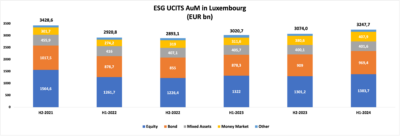The report reveals that ESG funds are at the heart of Luxembourg’s financial ecosystem, accounting for 73.3% of all UCITS assets under management (AuM). By the first half of 2024, ESG UCITS assets reached €3.25 trillion, marking a 12.3% increase since late 2022. This growth demonstrates a strong recovery from earlier market downturns, with investors increasingly drawn to sustainable finance products. A significant proportion of these funds follow exclusion strategies, which avoid investments in sectors such as fossil fuels, tobacco, and weapons. Meanwhile, involvement and screening strategies also play a key role, encompassing themes such as the UN Sustainable Development Goals (SDGs) and tailored ESG screening methods.

Luxembourg’s private markets have emerged as a focal point for sustainable finance, with assets under management surpassing €1.7 trillion in 2023. ESG funds have been a primary driver of this growth, soaring from €42.9 billion in 2019 to €622.8 billion in 2023—an extraordinary compound annual growth rate of 95.2%. Key areas of investment include private equity, infrastructure, and real estate, demonstrating Luxembourg’s ability to attract global capital seeking ESG-aligned opportunities.
Retail investors are increasingly driving ESG fund growth in Luxembourg. In the first half of 2024 alone, retail investors poured €12.6 billion into ESG funds, reflecting rising demand for sustainable investment options among individuals. Institutional investors, however, reduced their exposure during the same period, withdrawing €7.8 billion. While ESG bond funds attracted substantial inflows, equity-focused ESG funds experienced net outflows, illustrating shifting investor priorities within the sustainable finance market.
Luxembourg’s leadership extends beyond fund management to include robust engagement in international climate initiatives. The report highlights the country’s active participation in programs such as the Glasgow Financial Alliance for Net Zero (GFANZ) and the Partnership for Carbon Accounting Financials (PCAF). With 105 GFANZ affiliations, Luxembourg is demonstrating its commitment to leveraging finance as a tool to combat climate change and promote sustainability on a global scale.
Despite its successes, the report acknowledges several challenges facing Luxembourg’s sustainable finance sector. Inconsistent reporting on Principal Adverse Impact (PAI) indicators remains a significant issue, with financial market participants struggling to comply with the Sustainable Finance Disclosure Regulation (SFDR). Data limitations and a lack of standardisation further complicate efforts to effectively monitor progress and assess the impact of sustainable finance initiatives. Addressing these hurdles will be essential to maintaining momentum in the sector’s development.
Looking to the future, Luxembourg is well-positioned to seize new opportunities in sustainable finance. The introduction of the European Long-Term Investment Fund (ELTIF 2.0) structure promises to broaden access to private markets for retail investors, facilitating further ESG investment growth. Additionally, anticipated refinements to the SFDR framework are expected to enhance transparency and encourage broader adoption of sustainable finance practices across Europe. These developments align with Luxembourg’s commitment to remaining at the forefront of global financial innovation.
As the report underscores, Luxembourg’s unique position as a financial centre, combined with its proactive approach to sustainability, ensures its continued leadership in the global transition to a greener economy. By addressing existing challenges and building on its strengths, Luxembourg is poised to play a critical role in shaping the future of sustainable finance, offering innovative solutions and driving positive change on an international scale.
For those interested in a deeper exploration of the findings, the full report is available here.
